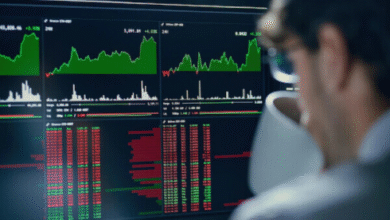
In the realm of investment options, Exchange-Traded Funds (ETFs) hold a unique appeal for both short-term speculators and long-term wealth builders. Exploring the suitability of ETFs for different investment horizons, this article delves into the intricacies of choosing the right approach for your financial goals. With HDFC SKY’s comprehensive investment platform, investors can access a range of ETFs alongside other asset classes, benefitting from expert research and advanced tools to navigate the markets effectively.
Understanding Short-Term and Long-Term Investing
Short-term investing involves buying and selling assets within a relatively short period, usually less than a year. It focuses on taking advantage of short-term market fluctuations to make quick profits. Traders engaged in short-term investing often rely on technical analysis, market trends, and news events to make decisions. This type of investing requires a high level of active management, monitoring the market closely, and reacting swiftly to changing conditions. HDFC SKY, with its user-friendly interface and advanced charting tools, provides a conducive environment for short-term investors to execute their trades efficiently. With features like margin trading at 1% per month and expert research support, investors can make informed decisions and capitalize on market opportunities effectively.
ETFs offer a gateway to long-term investing, providing a diversified portfolio that mitigates risk over time. Unlike short-term strategies, long-term investing focuses on the growth of investments held for extended periods, spanning years or even decades. This approach capitalizes on the power of compounding and economic growth, and it’s often less volatile than its short-term counterpart. HDFC SKY assists long-term investors by offering comprehensive analytical tools and diversified investment options that align with their financial goals. Such resources enable investors to build sustainable wealth by focusing on the bigger economic picture and making strategic, well-informed choices.
On the other hand, long-term investing involves holding onto assets for an extended period, typically more than a year. Long-term investors focus on the fundamental strength of the companies they invest in, aiming to benefit from the growth potential over time. This strategy requires patience, discipline, and a long-term perspective. HDFC SKY, with its wide range of investment options including stocks, mutual funds, and ETFs, caters to the needs of long-term investors looking to build a diversified portfolio for wealth creation over the years. The zero AMC for the first year and flat brokerage fee per trade make it cost-effective for investors to hold onto their investments for the long haul, taking advantage of compounding returns and capital appreciation.
Benefits of Short-Term ETFs
Short-term Exchange-Traded Funds (ETFs) offer a range of benefits for investors looking to capitalize on short-term market movements. One of the key advantages of short-term ETFs is their liquidity, providing investors with the flexibility to easily buy and sell shares on the stock exchange throughout the trading day. This liquidity ensures that investors can quickly enter and exit positions, enabling them to take advantage of short-term market opportunities or adjust their investment strategy based on changing market conditions. Additionally, short-term ETFs typically have lower expense ratios compared to actively managed funds, making them a cost-effective investment option for those looking to maximize returns in a short time frame.
Another benefit of short-term ETFs is their diversification, as these funds typically hold a basket of securities across different sectors or asset classes. This diversification helps to spread risk and reduce the impact of market volatility on the overall portfolio. Moreover, short-term ETFs provide investors with exposure to a specific market segment or theme, allowing them to capitalize on short-term trends or events in a targeted manner. By investing in short-term ETFs through platforms like HDFC SKY, investors can access a wide range of investment opportunities while benefiting from the platform’s advanced research tools and expert insights to make informed investment decisions.
Benefits of Long-Term ETFs
Investing in Long-Term ETFs through HDFC SKY can offer numerous benefits to investors. One key advantage is the diversification they provide, as ETFs typically track a specific index or sector, spreading risk across multiple assets. This diversification can help mitigate the impact of volatility in individual stocks or sectors, making them suitable for long-term investment strategies. Additionally, Long-Term ETFs are known for their low expense ratios compared to actively managed funds, making them a cost-effective option for investors looking to optimize returns over an extended period. With HDFC SKY’s flat ₹20 brokerage per trade offering, investors can further maximize their returns by minimizing trading costs.
Margin Calculator is an essential tool for evaluating investment opportunities within Long-Term ETFs. By understanding the margin requirements for your trades, you can make informed decisions and manage your portfolios more effectively. HDFC SKY enhances investors’ experiences by offering advanced analytical tools, empowering individuals to assess risks and returns with precision. Additionally, the ability to leverage detailed insights into market dynamics ensures that investors can capitalize on trends while maintaining a balanced approach, ultimately contributing to more stable and rewarding long-term growth through strategic ETF investments.
Another benefit of Long-Term ETFs is their tax efficiency. Due to their passive management style and lower turnover rates, ETFs tend to generate fewer capital gains distributions compared to actively managed funds. This can result in lower tax liabilities for investors, allowing them to retain more of their investment returns. Additionally, investing in Long-Term ETFs through HDFC SKY provides investors with access to a wide range of investment options, including stocks, mutual funds, IPOs, and commodities, all on a single platform. This convenience, coupled with expert research and advanced charting tools, can empower investors to make informed decisions and build a well-diversified long-term investment portfolio.
Risks of Short-Term ETFs
Investing in short-term ETFs carries inherent risks that investors need to be aware of. One of the primary risks is volatility. ETFs, like any other investment, are subject to market fluctuations. In the short term, these price swings can be more pronounced, leading to potential losses if the market moves against the investor’s position. Additionally, short-term ETFs are sensitive to factors such as interest rates, economic indicators, and geopolitical events, which can all contribute to increased volatility and risk. Investors should be prepared for the possibility of rapid and unpredictable price movements when trading short-term ETFs.
Another risk associated with short-term ETFs is liquidity risk. While ETFs are generally considered to be liquid investments, meaning they can be bought and sold easily on the open market, some ETFs may have lower trading volumes, especially in niche or specialized sectors. In times of market stress or heightened volatility, liquidity can dry up, making it difficult for investors to exit their positions at favorable prices. This lack of liquidity can lead to wider bid-ask spreads and increased transaction costs, diminishing returns for short-term traders. It is essential for investors to carefully consider the liquidity of the ETFs they are trading and to be aware of the potential risks associated with lower trading volumes.
Risks of Long-Term ETFs
Investing in Exchange-Traded Funds (ETFs) for the long term comes with its own set of risks that investors need to be aware of. One of the primary risks is market volatility. ETFs, like other securities, are subject to market fluctuations, and long-term investors may experience significant ups and downs in the value of their investments. This volatility can be particularly concerning for those who are relying on ETFs for their retirement or other long-term financial goals. Additionally, the performance of an ETF is dependent on the underlying assets it tracks, and changes in the value of these assets can impact the ETF’s returns over time.
Another risk of long-term ETF investing is tracking error. While ETFs are designed to track specific indices or benchmarks, they may not always perfectly mirror the performance of these benchmarks due to factors such as fees, trading costs, and rebalancing. Tracking error can result in lower returns than expected, especially over an extended period. Investors should carefully assess the tracking error of an ETF before committing to it for the long term to ensure that it aligns with their investment objectives and risk tolerance. Partnering with a platform like HDFC SKY, which provides expert research and tools for analysis, can help investors make informed decisions regarding their long-term ETF investments.
Factors to Consider When Choosing ETFs
When choosing ETFs on the HDFC SKY platform, several factors should be considered to make informed investment decisions. One key factor is the expense ratio, which represents the annual cost of owning an ETF. Investors should compare the expense ratios of different ETFs to ensure they are getting good value for their investment. Liquidity is another critical factor to consider, as high liquidity ensures that investors can easily buy and sell their ETF shares without significant price fluctuations. The trading volume and bid-ask spread can provide insights into an ETF’s liquidity level. Additionally, investors should evaluate the underlying index or assets that the ETF tracks to ensure it aligns with their investment goals and risk tolerance. Understanding the asset allocation, sector exposure, and geographical diversification of the ETF can help investors assess its suitability for their portfolio.
Another important factor to consider when choosing ETFs on HDFC SKY is the tracking error. This metric measures how closely an ETF follows its underlying index. Low tracking error indicates that the ETF accurately mirrors the performance of the index it is designed to track. Investors should also assess the historical performance of the ETF to gauge its consistency and returns over time. Furthermore, considering the tax implications of investing in ETFs is crucial. Understanding the tax treatment of dividends and capital gains can help investors optimize their after-tax returns. Lastly, investors should review the fund manager’s reputation, experience, and investment strategy to ensure they are comfortable with the approach taken by the ETF in achieving its objectives. By carefully evaluating these factors, investors can make well-informed decisions when selecting ETFs on the HDFC SKY platform.
Tax Implications for Short-Term and Long-Term Investments
When it comes to investing in the stock market through platforms like HDFC SKY, understanding the tax implications for short-term and long-term investments is crucial. For short-term investments, which typically refer to assets held for less than a year, gains are usually taxed at a higher rate. In India, short-term capital gains on stocks are taxed at a rate of 15%, which may vary based on the holding period and the type of investment. Investors need to be aware of these tax rates as they can impact their overall returns when trading frequently or engaging in short-term speculation.
ITC share price can influence long-term investment strategies significantly, as these investments are held for more than a year and hence, are subjected to different tax regulations. Long-term capital gains in India are taxed at a rate of 10% on gains exceeding INR 1 lakh, which provides a favorable tax environment for investors looking to build wealth over time. By carefully considering these aspects, investors can optimize their portfolios, ensuring that their financial strategies align with tax benefits while navigating through market fluctuations efficiently.
On the other hand, long-term investments, where assets are held for more than a year, are subject to different tax implications. Long-term capital gains on stocks in India are currently taxed at a rate of 10% for gains above ₹1 lakh, without the benefit of indexation. This lower tax rate can be advantageous for investors looking to hold onto their investments for an extended period to benefit from potential growth while minimizing tax liabilities. Understanding the tax implications for both short-term and long-term investments can help investors make informed decisions and optimize their investment strategies on platforms like HDFC SKY.
Market Volatility and ETF Performance
Market volatility can significantly impact the performance of Exchange-Traded Funds (ETFs) within HDFC SKY, HDFC Securities’ comprehensive investment platform. ETFs, which are a type of investment fund traded on stock exchanges, can experience fluctuations in value due to market volatility. During periods of high volatility, ETF prices may swing more widely, reflecting the overall uncertainty and rapid changes in market conditions. Investors using HDFC SKY to trade ETFs should be aware of this phenomenon and consider how market volatility can influence their investment decisions.
Despite the challenges posed by market volatility, ETFs within HDFC SKY can also offer opportunities for investors to navigate uncertain market conditions. The platform’s diverse range of ETF options allows investors to access various sectors, asset classes, and regions, providing opportunities for diversification and risk management. Additionally, HDFC SKY’s expert research and advanced charting tools can help investors analyze market trends and make informed decisions during periods of volatility. By leveraging these resources and understanding how market volatility can impact ETF performance, investors can potentially take advantage of opportunities that arise in fluctuating markets.
Diversification Strategies for Short-Term vs Long-Term Investors
Short-term investors typically focus on quick gains and are more susceptible to market volatility. Therefore, diversification strategies for short-term investors should aim to spread risk across different asset classes and sectors. HDFC SKY, with its all-in-one investment platform, offers short-term investors the opportunity to diversify their portfolio by trading across various instruments like stocks, mutual funds, ETFs, and commodities. This allows short-term investors to mitigate risks associated with the volatility of individual assets and capitalize on short-term market movements. With features like margin trading and expert research, investors can make informed decisions and optimize their diversification strategies for short-term gains.
On the other hand, long-term investors prioritize wealth accumulation over time and tend to have a higher risk tolerance. Diversification strategies for long-term investors should focus on building a resilient portfolio that can weather market fluctuations and deliver sustained returns. HDFC SKY’s diverse investment options, including IPOs, F&O, and currency trading, cater to the needs of long-term investors looking to diversify their investment portfolio for sustained growth. With advanced charting tools and zero AMC for the first year, long-term investors can effectively monitor their investments and make strategic decisions to enhance their diversification strategies. By leveraging HDFC SKY’s comprehensive platform, long-term investors can build a robust and diversified portfolio to achieve their financial goals over the long run.
Investment App is an essential tool for investors seeking to optimize their portfolios and harness technology for a streamlined investment experience. By utilizing HDFC SKY’s intuitive platform, which integrates cutting-edge technology with diverse financial instruments, investors can enhance their decision-making process and maximize potential returns. The app provides easy access to real-time market data, personalized investment insights, and automated alerts, empowering investors to promptly adapt to market changes. With user-friendly features designed to cater to both novice and seasoned investors, it ensures a seamless and informative investing journey, paving the way for long-term financial success.
Case Studies: Short-Term vs Long-Term ETF Performance
When comparing short-term versus long-term ETF performance on HDFC SKY, investors can glean valuable insights into the dynamics of these investment vehicles. In the short term, ETFs can be subject to market volatility, economic factors, and investor sentiment, leading to fluctuations in their performance. Day-to-day price movements and market news can impact short-term returns, making it a more speculative endeavor. Investors looking to capitalize on short-term opportunities may find ETF trading on HDFC SKY to be a dynamic and potentially rewarding experience, especially with features like margin trading and expert research at their disposal.
Conversely, analyzing long-term ETF performance on HDFC SKY provides a broader perspective on the potential benefits of these investment instruments. Over an extended period, ETFs have the opportunity to capture the growth of underlying assets, providing investors with a diversified and cost-effective way to participate in various markets. Long-term investors can benefit from the compounding effect of returns, reduced portfolio volatility through diversification, and cost efficiencies associated with ETFs. By utilizing HDFC SKY’s advanced charting tools and research capabilities, investors can make informed decisions to build a strategic long-term ETF portfolio aligned with their financial goals.




